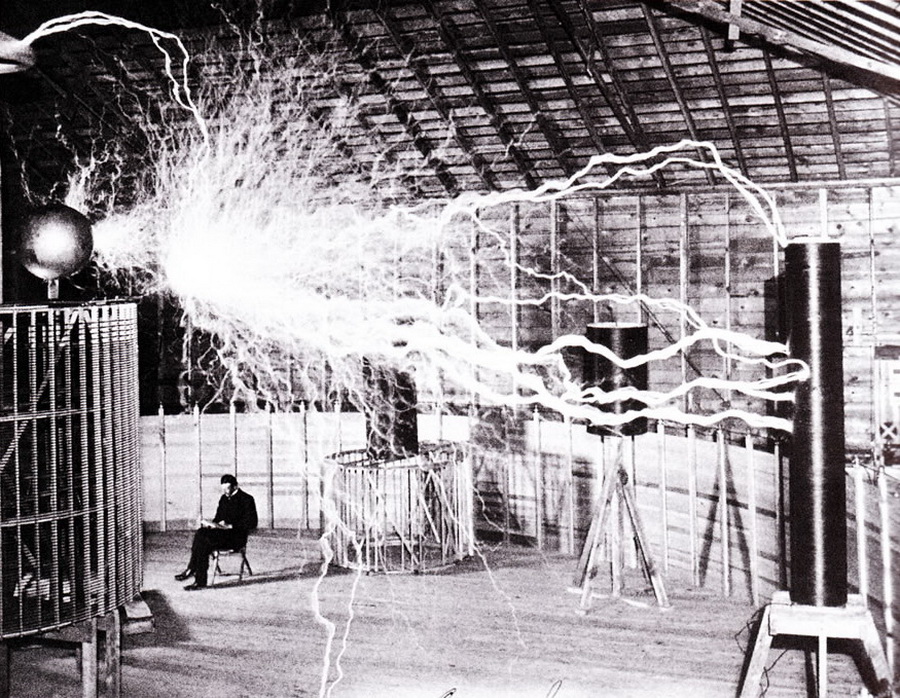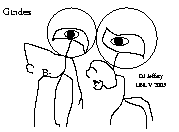

Phy 111L, Phy 112L, Phy 161L, Phy 262L, 2011 Spring
The course mottos: very reassuring I think.
Credit: The photo is cited as a double exposure by Carl Willis and Marc Seifer; Uer:Skies.
Linked source: Wikipedia image http://en.wikipedia.org/wiki/File:Tesla_colorado_adjusted.jpg.
Permission: Public domain at least in USA.
Syllabus items on this site are subject to change at the discretion of the instructor. Any changes will be announced in class as well as made on this page.
From Wolfson & Pasachoff, p. 687, and relevant to Semester II Labs mainly.
---------------------------------------------------------------
Current Range Human Effect
(mA)
----------------------------------------------------------------
0.5--2 threshold of sensation
10--15 involuntary muscle contraction; can't let
go of source
15--100 severe shock, loss of muscle control,
difficulty breathing
100--200 fibrillation of the heart, death within minutes
>200 cardiac arrest, breathing stops, severe burns
----------------------------------------------------------------
Tip: If you are outside and your hair starts standing on end,
get out of that place.
 Beware of aliens bearing grades.
Beware of aliens bearing grades.
The basic syllabus is presented in the lab manual.
Remember that Phy 112L is just a part of Phy 112: it is NOT a stand-alone course. The lab grade IS part of the Phy 112 grade.
A present there are no additions to the basic syllabus worth mentioning.
The basic syllabus is presented in the lab manual.
Remember that Phy 262L is NOT a part of Phy 262: it IS a stand-alone course.
There are variations from the basic syllabus in the lab manual. The instructor is always making adjustments.
There will be short quizzes at the end of most lab sessions time permitting. The quizzes will count for part of the lab grade up to 50 %, but usually less. The weighting of the quizzes varies from lab to lab.
For ordinary labs, each person hands in their own reports. It's expected that students collaborate on these, but there should be no direct copying. Everyone should understand things for themselves and write out their own answers.
The groups will produce a single lab report for the extended labs.
There is a preparation mark. For every lab, except the first one, students will need to read the lab and other material before the lab period. The other material will consist of online notes prepared by the instructor and related articles from Wikipedia or other online sources.
The lab notes are linked below in Semester II Labs. They are nott yet fully prepared for this semester, but will be week by week. The instructor will also send an email specifying the preparation.
The preparation is marked by you, the student, affirming in the lab period to the instructor that you have done it the lab period. There are NO part marks. You only get a mark for having read all the preparation.
The rationale for the preparation mark is that students are not likely to do the preparation adequately without it---you know this is true.
The rationale for the preparation is that the labs need preparation both for the actual manipulations and for understanding what is going on. Students strongly objected to long introductions (30 minutes or so) to the lab in the lab period. With preparation, the introduction can be cut short to 10 minutes or so---and we have more time work with the equipment and see how to do things.
The grading scheme for the course is below.
--------------------------------------------
Tentative Grading Scheme
--------------------------------------------
Ordinary labs 60 % or more or less (one drop)
Extended labs 30 % or more or less
preparation 10 % or more or less (one drop)
--------------------------------------------
The lowest ordinary lab mark is dropped, and so people can afford to miss
one ordinary lab.
There may be a chance for make-ups at the end of the semester, but this
depends on all kinds of things---so don't count on it.
One preparation is considered a drop too.
There are two sections of Phy 262L. The instructors are coordinating, but they will usually not do things identically: they will not mark identically, they will not weigh graded items identically, and the quizzes will not be the same in general.
Below are the Phy 112L/Phy 262L labs.
Phy 112L and Phy 262L have different sets of labs, but there is considerable overlap. Thus a single listing is reasonable.
The labs here are just listed in a reasonable order.
Check your lab manual for the lab order for your course. But that order is tentative. The order may change depending on the circumstances of the semester.
The Phy 112L/Phy 262L labs are good concept labs and good hands-on labs.
They are not usually designed teach the use of significant figures or error analysis. So in most labs we don't worry about those things. Typically relative uncertainties in quantitative data and calculated results are of order 20 %.
BUT there are some labs, particularly some of the Phy 262L labs where significant figures or error analysis are used. You'll be told when you need to do those by the instructor.
With each lab is a set of links that gives links for background information for the Phy 112L/Phy 262L labs.
There is a link to a list of links of general relevance to electricity, magnetism, or optics. There is also a link to labs notes that are particularly useful for students in preparing for a lab and sometimes a link to extended notes that are mainly for instructor use, but students can study them too.
There are also a list of links especially relevent to the each particular lab.
The Phy 262L lab prepartion consists of reading the lab manual and, usually, reading the lab notes and the especially relevant links articles.
There are quiz answers for some of the Phy 262L labs. These appear only after the quiz is over and when the instructor finishes writing them up.
This section is still under construction. The information will be updated as the semester proceeds.
Especially Relevant Links
Especially Relevant Links
Animations of electric fields for common simple charge distributions.
Especially Relevant Links
Especially Relevant Links
Especially Relevant Links
Especially Relevant Links
Especially Relevant Links
Especially Relevant Links
Especially Relevant Links
Especially Relevant Links